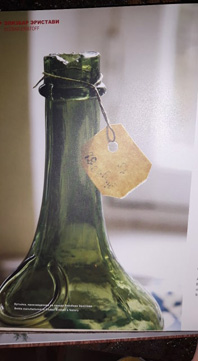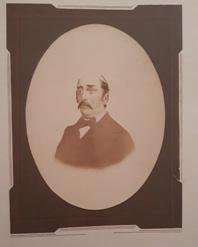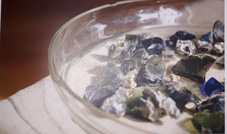
Elizbar Eristavi - Country of Liquid Sun
Wednesday, April 8
Elizbar Eristavi is one of the prominent figures of Georgian history of the nineteenth century. One of the main reasons for his popularity is the fact that he, practically, led the plot of 1832. Unfortunately, very scarce materials have survived as concerns his biography and his efforts in culture and education. He was born in Gori, either in 1808 or 1810, and was distinguished by his political views, cultural-educational activities, interminable energy and for having the flair of an entrepreneur.
Before the plot of 1832, Prince Elizbar Eristavi was in St-Petersburg in 1832-30 where he studied first at private boarding school and then, for the purpose of mastering military art, he finished the School of Artillery. In the capital of the Empire, Eristavi made friends with Dimitri Batonishvili and under his influence became a member of a the plotters' secret organ isation alongside Solomon Razmadze, Aleksandre Cholokashvili, David Jorjadze, Dimitri Eristavi, Vakhtang Orbeliani and other prominent figures.
The purpose of the organisation was the restoration of the independence of Georgia.
In 1930, upon returning to his homeland, the young Prince became the leader of the plot and began to look for devoted Together with Aleksandre Orbeliani and Solomon Dodashvili, he followers. established the Hheadquarters where of the Plotters and developed the plan for the rebellion was developed, known as the "Decree of the First Night," which was to be implemented directly under his leadership. Elizabar Eristavi was also the main author of the project of the Christian-Democratic plan for Georgia. He had contact with Aleksandre Baton- ishvili, who lived in Iran, as well as with the participants of the Polish rebellion of 1830-1831 who would be involved in the armed military actions. Eristavi was the person who suggested the establishment of a periodical publication for increasing public awareness in favour of the rebellion to Solomon Dodashvili. He also asked Grigol Orbeliani to trans- late Rileev's Nalivayko's Confession. Eristavi actively participated in the plotters meetings where they talked about the necessity of the dissemination of education in Georgian society and other related practical issues. In other words, he was one of the most active figures in the cultural-educational processes initiated by Solomon Dodashvili and the preparation of the ideological basis for the future plot.
After uncovering of the plot of 1832, Elizbvar Eristavi, as "one of the leaders of malefactors," was sentenced to death by "quartering." The punishment was later changed and his crime was referred to under the second category as an "initiator of the plot and instigator of others to join the plot and rebel- lion" and was exiled to Finland; namely, to Helsingfors (presently Helsinki) where he spent 11 years as an ordinary soldier of one of the regiments. Upon his return to his homeland, Prince Elizbar Eristavi entered into official service and ended his career in 1869 as the Head of the Province of Gori in the rank of Colonel and, after retirement, was awarded the rank of Major General.
Elizbar Eristavi's family was a centre of meetings for the intelligentsia and an important cultural centre for literary meetings and drama performances.
His son, Ivane, continued the tradition which established by his father. With flair for entrepreneurial activities; Eriastavi's flair and his works are very interesting, indicating the diversity of his interests and capabilities, He worked towards the development of industry and gardening in k and even invited fruit-growing specialists from Europe.
According to the existing information, the ancestors of Elizbar Eristavi were involved in glass production as early as the eighteenth century business, however, which was initiated in 1841-1842 under the leadership of Elizbar and Dimitri Eristavi, and which provided for putting glass factories in the province of Gori-including the village of Gvarebi in the Ateni Gorce- into operation, was connected with great risk, They would aware of the fact that Major General Eristavi set up a glass factory in the Ksani Gorge as early as 1821 and that he ordered the relevant equipment and invited a technician. In spite of his great efforts, however, Eristavi suffered a failure and did not manage to put the factory into operation. The initiative of Ivan Levashev, the glass production specialist who was invited by Zavileisky, the Civil Governor of Georgia, in 1828 was also un successful. The technicians, again invited from Russia by Zavileisky in 1834, managed to establish the glass factory and started production for a certain period of time but then, for particular reasons, it stopped functioning.
The Titular Councellor, Ishkhneli, also set up a glass factory in Tbilisi in 1841 but it could not compete with the product made by the Eristavis in Gvarebi and it was abandoned in 1843.
The products of the Eristavi's glass factory were initially green in colour and not distinguished for their high quality. Additionally, the Eristavis made experiments to make window glass but it also had a green colour. Elizbar Eristavi went to Bohemia to consult with local specialists in order to improve the business but production of average quality window glass became possible in the Gvarebi factory only by 1845.
After 1845, the Eristavis decided to extend their production and began the construction of a porcelain factory next to the glass factory. Dimitri Eristavi even obtained a ten-year privilege in 1846 for the support of this initiative.
The further production of window glass was hampered because Prince Elizbar Eristavi was called to the Crimean War. During this period, a factory produced only glass-ware. In 1855, for unknown reasons, there was a fire in the Gvarebi glass factory with products valued at three thousand roubles being destroyed.
Unfortunately, the exact date of the death of this prominent figure is not known. Presumably, Prince Elizbar Eristavi died in 1870-1872, either on 11 January or 11 June. He was buried in Gori, in the yard of Cathedral Church, the Sobor.





